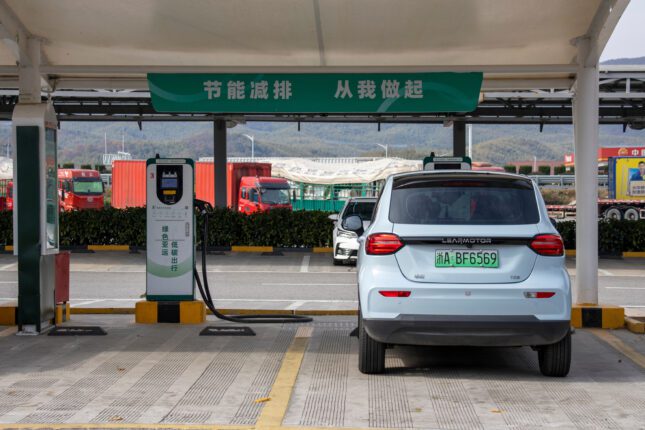-
In the Blindspot: Security and Chinese EV Exports to the Global South
November 25, 2025 By Steven GaleThe most persuasive argument for global EV adoption is the positive impact that these vehicles have for the environment. A scientific consensus has emerged around the benefits of electric vehicles and their zero tailpipe emissions, ranging from local air quality improvement to increased energy efficiency.
Governments also see the upside on multiple fronts. Not only did delegates at COP 30 state that EVs are pivotal in the fight against climate change, but the manufacture of these vehicles offers the opportunity for a wave of skilled and unskilled job creation. Thailand is now a “top-ten” EV producer, for instance.
There may be a hefty price tag for the EV boom in both national security and personal privacy, however. Chinese EVs have the potential to collect sensitive information on drivers and passengers built into their production. It is a risk that has been articulated with considerable alarm by numerous natsec and privacy experts over the past few years.
This is especially true in the developing world. China has already pushed well into the lead in the global EV market. Last year, Chinese EVs made up 75 percent of all exports to global south countries. Consumers in Southeast Asia and Africa are particularly hungry for China’s high tech and inexpensive EVs. Their governments increasingly require Chinese EV and battery firms to build up manufacturing in their countries. It is an EV revolution that offers global south countries economic, pollution reduction and decarbonization benefits.
The question for the Global South is clear: Can the EV boom bring all its immense benefits without the massive security and privacy risks created by China’s dominance in the field?
Lower Costs Drive Brisk Adoption
The increasing demand for EVs in low-to-middle-income countries might come as a total surprise to many who think of the obvious market for them in high-income countries. Yet recent data show that developing countries are at the forefront of EV adoption and for good reason: cost savings.
A recent World Bank study of 20 developing countries across Africa, Asia, the Caribbean, Oceana, Europe and South America reported that more than half would benefit economically by adopting EVs with lower operating costs. Lower EV life cycle costs (fuel, maintenance repairs) also offer substantive savings. And while upfront EV costs can exceed those for internal combustion engines, new EV car prices continue to decline. In fact, it has been reported that nearly one-half of all electric vehicles now cost less than gas powered ones. Lower costs are spurring EV adoption in Ethiopia, Thailand, Morocco, Brazil, and Egypt.
Indeed, some of these lower prices and increased sales may be accelerated by China’s push to move to flood markets (including in the Global South) with so-called “zero miles used vehicles.” This is a tactic in which new Chinese EVs are quickly de-registered and labeled as a “used” vehicle for speedy export abroad, and it has drawn increasing notice and regulation in target markets.
Leaping Over Adoption Hurdles
Despite a rapid adoption of EVs, developing countries do still face barriers to greater uptake. Many developing countries lack a sufficient number of charging stations, as well as a reliable charging station network. Most stations are located in capitals and a few larger cities. The power grid necessary to support these stations is unreliable in many nations, and periodic outages are all too common. And even when electrical power is steady, minimal technological standardization for charging facilities further undermines driver confidence.
Financial factors also play a role. In poorer countries, many potential buyers often encounter limited access to financing. The loans to obtain an EV may be more difficult to secure, and come with at a higher price tag. Lower income purchasers also may think twice about the costs of buying a new battery when the original eventually fails.
Lack of knowledge about EV capacity and costs is another potential hitch. Some individuals (especially those in poorer countries) may not be as aware of the ownership benefits of EVs— including their lower life-time costs, the range of EVs, and the availability of local charging stations also may be a serious concern.
All of these factors play out in a particular information ecosystem as well. Many developing nations lack a well-developed strategy to promote EV adoption. This may be changing now, however, as several developing countries accelerate adoption through policy and regulatory incentives. There are now over 24,000 EV chargers across Indonesia, Thailand, Malaysia and Vietnam, which is almost 10 times more station than were available only 3 years ago.
Routers and Risks
As noted, vehicles manufactured in the PRC now dominate developing country vehicle imports, with reportedly high adoption rates in Nepal, Thailand, Indonesia, South Africa, Kenya, Brazil, Chile and others. Yet Chinese automakers continue to produce and export EVs loaded with sophisticated electronic gear that has the potential to collect sensitive driver and passenger information. Will developing countries continue brisk adoption of these vehicles without the expertise to mitigate any potential security and personal data threats?
Alarms about potential security threats from Chinese-manufactured technology are continuous in many nations. The Washington Post recently reported that multiple federal agencies have backed a proposal to ban all sales of a popular router made by Chinese-affiliated telecommunication company TD-Link because of potential Chinese espionage. These concerns are anchored in prevailing PRC laws that compel all Chinese companies to hand over sensitive information to their intelligence agencies.
The potential dangers from EVs in this regard are increasingly well-documented. A 2024 White House Fact Sheet highlighted threats to the US from “connected vehicle systems” that allow external connection via Bluetooth, cellular satellites, and Wi-Fi—and perhaps disrupt national digital networks. These automated driving system technologies also have the capacity to collect sensitive data as well as activate cameras and sensors to geolocate vital infrastructure such power plants, electrical transmission lines, airports, military installations, and water supply systems.
The 2025 Munich Security Forum pointed out that the latest integrated EV technologies (e.g., radar sensors, scanners, microphones, facial recognition cameras) can be used by malicious state and non-state actors to disrupt critical civilian, commercial, and military transport systems. They also can be deployed to collect personal data from high level government, military, and business officials. Malicious imbedded code within these systems might even have the potential to be remotely manipulated at a later time, opening “backdoors” to disrupt critical government operations (telecom, websites, electrical grids) and/or intentionally damage vital supply chain links.
If major economic powers with broader cyber defense capacities see immense risks, it is fair to ask whether developing countries possess the staffing depth, ministry coordination, and ongoing oversight to help guard against imported EVs being a “Trojan Horse” to threaten their own already fragile economic stability.
Tapping the Brakes
There are ways in which developing countries can gain greater cybersecurity expertise to guard against possible national security and personal identity threats from imported EVs. Among these measures would be to consider intelligence-sharing agreements with trusted partner countries that can spotlight threats. Other steps include developing and continually revising import-based EV security standards, and beefing up Port-of-Entry custom inspection regimes to uncover suspicious modifications that might enable unwelcome surveillance and digital network intrusions.
As Chinese-manufactured EVs continue to push more forcefully into markets in the Global South, such safe-guard efforts should signal to automakers in that nation and elsewhere that while EV vehicle imports are welcome, nations will take prudent and necessary actions to curb potential national security threats and safeguard privacy.
Steve Gale is a Senior Strategic Advisor at Global Foresight Strategies LLC, Senior Foresight Advisor emeritus at USAID. He has previously served as Human Security Senior Advisor at the National Intelligence Council.
Sources: ANSI (EVSP); Energy Futures Lab; EV Highlights; Forbes; FP Analytics; Global Voices; IEA; Inside EVs; Intel.gov; MDPI; The New York Times; Stat Ranker; US Department of Homeland Security; The Washington Post; White House Press Office; World Bank; World Resources Institute
Photo Credits: Licensed by Adobe Stock.
 A Publication of the Stimson Center.
A Publication of the Stimson Center.









